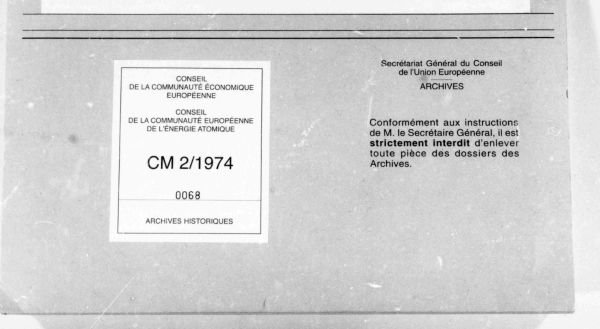The European Council, originally established as a summit forum for the leaders of the European Communities, has since evolved into one of the European Union’s most crucial institutions.
On 9 and 10 December 1974 the nine leaders of the European Communities met for a summit in Paris. This would come to be seen as the founding moment of the European Council. To mark its 50th anniversary, the Council’s archives invite you to explore this significant event through their documents.
The beginning
In February 1957, the Heads of Government and Foreign Ministers of the six Member States of the European Coal and Steel Community gathered in Paris to resolve outstanding issues related to the drafting of the Rome Treaties. This marked the starting point for occasional European summits, providing leaders with a forum to address critical issues beyond the scope of the Treaties, such as relations with non-member countries and ways to strengthen political collaboration.
”Vive le Conseil Européen!”
On 9 and 10 December 1974, at the invitation of French President Valery Giscard d’Estaing, the Heads of State and Government of the European Communities convened for an historic summit in Paris.
At the Quai d’Orsay, nineteen key figures gathered around the table: nine national leaders, their foreign ministers, and the President of the European Commission. This meeting would soon be recognised as the birthplace of the European Council.At the final press conference, the French President Valéry Giscard d’ Estaing announced the creation of the European Council as a new governance body.
Que peut-on dire des travaux des chefs de Gouvernement européen de ces deux derniers jours ? On peut en dire que nous avons assisté au dernier Sommet européen et que nous avons participé au premier Conseil Européen. Et, reprenant une vieille expression française, nous pourrions dire que « le sommet Européen est mort, vive le Conseil Européen.
The declaration emphasized the distinct nature of the European Council compared to previous European summits:
… il s’agissait d’une réunion d’une autre nature, c’était une conférence comprenant de nombreux experts alors que la méthode qui a désormais été retenue, est celle d’un Conseil qui ne réunit, …que les Chefs de Gouvernement et les Ministres des Affaires étrangères.
The “Final Communiqué”, a blueprint for the European Council

At the conclusion of the Summit, the Nine reached a consensus and issued a “Final Communiqué”, summarising the outcomes of their discussions. The document outlined the founding principles of the European Council:
- Sketches the political context: “… the need for an overall approach to the internal problems in achieving European unity and the external problems facing Europe…”
- Identifies the participants, the framework and sets the regularity of the meetings: “…. to meet, accompanied by the Ministers of Foreign Affairs, three times a year and, whenever necessary, in the Council of the Communities and in the context of political co-operation.”
- Specifies the role of the foreign ministers, who: “…will act as initiators and coordinators…”
- Affirms the intention to ensure diplomatic coordination: …in all areas of international affairs, which affect the interests of the European Community.”
- Defines the role of the President: “The President in office will be the spokesman for the Nine and will set out their views in international diplomacy.”
- Expresses the intention to expand the policy domains: “Co-operation between the Nine in areas outside the scope of the treaties will be continued … It should be extended to other areas by bringing together the representatives of the governments…”
Read the full communiqué:
Download The “Final Communiqué” – Official PDF Scan (105 MB)
The legacy
The first official meeting of the “European Council” took place on 10 and 11 March 1975 at Dublin Castle, Ireland. Since then, European leaders have met regularly, at least twice a year, to provide political momentum and address critical issues within the European Union.
Over the past 50 years the European Council has been instrumental in driving significant developments within the European project and providing essential political momentum for the European Union.
Since 2009, the European Council has been a fully-fledged institution with its own President. It defines the general political direction and priorities of the European Union.
The Council’s archives collection
For those interested in learning more about the European Council’s history, the online Council Archives collections provide a comprehensive view of its evolution.
European Council meetings collection
The files on the European Council’s meetings are organized in four sections and include documents related to:
- the political preparation, including Presidencies’ positions, draft conclusions, delegations’ opinions.
- the outcomes of the meetings: European Council conclusions, Political Cooperation declarations, press conferences, speeches.
- the political follow-up, such as European Parliament resolutions, reports, feedback from civil society, etc.
- the logistical arrangements: protocol matters – agendas, participants’ lists, security, meeting room management, catering, interpretation, translation of documents, and other organisational aspects.
This post does not necessarily represent the positions, policies, or opinions of the Council of the European Union or the European Council. The Council Library reading room is open on Monday to Friday from 12.30 to 15.30. The Info Desk operates during office hours from Monday to Friday.
If you are a researcher or university student, you are welcome to visit our reading room for on-site consultation of our collections.
Source – The European Council
